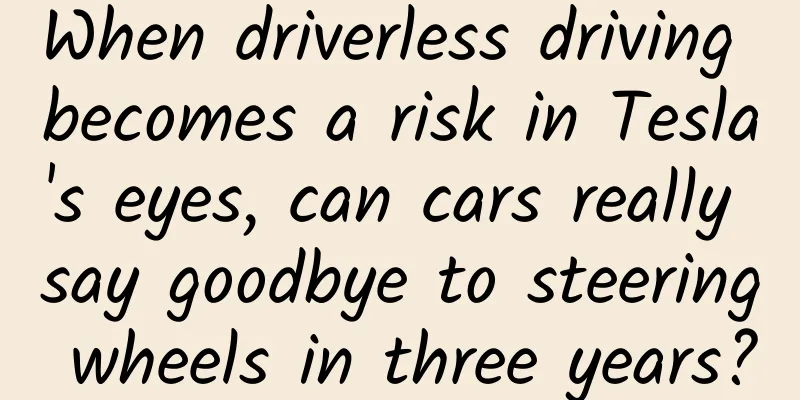When driverless driving becomes a risk in Tesla's eyes, can cars really say goodbye to steering wheels in three years?

|
Not long ago, Tesla CEO Elon Musk posted a message on Twitter to thank those users who have pre-ordered the company's entry-level car Model 3 for taking the risk for the product. Under the rapid technological innovation, driverless cars effectively ensure that the safety of passengers is still a priority The progress made in ultra-large-scale computing power, big data, machine learning, and especially deep learning algorithms has given rise to this wave of artificial intelligence enthusiasm and promoted the development of related industries. As a pioneer in the application of artificial intelligence technology, the automotive industry has attracted much attention from the industry at home and abroad since its appearance in the public eye. Today, GM has announced that it has begun producing Chevrolet Bolt self-driving cars and will test them on the streets of San Francisco. NVIDIA, one of the world's largest chip manufacturers, has also said it will work with Volvo and Volkswagen to develop the "brain" for self-driving cars. Google's driverless car division Waymo, Apple and NXP Semiconductors (NXP) are all developing driverless car systems for automakers. However, no matter how complete the application of autonomous driving is in reality, the primary consideration of all users is still the issue of safety. The same is true for developers. It is not an exaggeration to call it the cornerstone of the "technological innovation pyramid" to some extent. It can be seen how important a reliable technical solution is. From any perspective, the current driverless cars are not "intelligent" enough. They are not able to enter all special situations into the system and handle various extreme accidents like humans. Even if the relevant sensors are very stable, they cannot accept the possibility of failure. Legislation and public transportation trial and error: Can the domestic industry follow the lead of overseas industries? The speed of development of autonomous driving technology has left a deep impression on people. In terms of road testing, the United States, Germany, Japan, South Korea, and my country are all actively promoting road testing, which is the basis for the application of autonomous driving vehicles. The industry has also been looking forward to the introduction of relevant policies for autonomous driving vehicles. On June 20, the first federal legislation for self-driving cars in the United States came into effect. These bills initially included 14 articles, giving the National Highway Traffic Safety Administration (NHTSA) the authority to manage driverless cars on public roads. The reason why automakers and large technology companies actively support the implementation of laws and regulations is basically out of the vision of developing successful self-driving cars faster than their competitors. Waymo, a subsidiary of Alphabet, announced a partnership with Avis, which is responsible for managing its driverless cars in Arizona. At the same time, there are reports that Apple is renting cars from Hertz to test driverless technology. Obviously, traditional car rental companies have become popular under the influence of driverless technology. Once the corresponding bill is passed, companies like Waymo and Uber will openly test driverless cars on the road in large numbers. So the issue of safety and security is inevitably put on the agenda. From the domestic situation, the Ministry of Industry and Information Technology launched a pilot demonstration of intelligent connected vehicles in Shanghai last year; and carried out "Intelligent Vehicle and Smart Transportation Application Demonstration Based on Broadband Mobile Internet" in Zhejiang, Beijing, Hebei and other places to promote autonomous driving testing. To this end, Beijing has also issued a five-year action plan for intelligent vehicle and smart transportation application demonstration, which will complete the intelligent road network transformation of all trunk roads within the Beijing Development Zone by the end of 2020, and deploy 1,000 fully autonomous driving vehicles in stages for application demonstration. In November 2016, Jiangsu signed a tripartite cooperation agreement with the Ministry of Industry and Information Technology and the Ministry of Public Security to jointly build a national intelligent transportation comprehensive test base. In addition, the intelligent connected vehicle standard system plan drafted by the Ministry of Industry and Information Technology will be released to the public soon, and the vehicle networking standard system is also being gradually improved, which is crucial for the development of intelligent connected vehicles. Including my country, it can be seen that all countries have set 2020 as an important time node, hoping to achieve full deployment of self-driving cars by then. Although there are still objections from safety and consumer rights protectionists, especially under the premise that self-driving cars can promise to reduce or eliminate traffic accidents. However, in small areas such as university campuses and around companies, the gradual promotion of related products will also help people adapt to driverless technology. Once people realize that self-driving is as convenient and safe as shared bicycles, then its era will officially come. As a winner of Toutiao's Qingyun Plan and Baijiahao's Bai+ Plan, the 2019 Baidu Digital Author of the Year, the Baijiahao's Most Popular Author in the Technology Field, the 2019 Sogou Technology and Culture Author, and the 2021 Baijiahao Quarterly Influential Creator, he has won many awards, including the 2013 Sohu Best Industry Media Person, the 2015 China New Media Entrepreneurship Competition Beijing Third Place, the 2015 Guangmang Experience Award, the 2015 China New Media Entrepreneurship Competition Finals Third Place, and the 2018 Baidu Dynamic Annual Powerful Celebrity. |
<<: Waymo withdraws some of its allegations against Uber: 3 of 4 patent lawsuits withdrawn
>>: Will iPhone 8 create another miracle? It is likely to disappoint Apple fans again
Recommend
Are there any healthy snacks that won’t make you fat? The truth →
More and more people eat snacks not only to resis...
Who threw green paint on Kapibala? ? | Environmental Trumpet
AI discovers traces of endangered birds Although ...
11 great websites for learning iOS development
[[138057]] Never stop learning from others I beli...
Meituan's new challenge: Tier 3 and 4 markets are impacted, and many O2O giants are involved
As a survivor of the group buying war, Meituan ha...
Is the kelp you eat female, male, or hermaphroditic?
Kelp is a common guest on the dinner tables in co...
How to master oCPC and efficiently complete customer acquisition and conversion?
Mobile Internet access, mobile payment, online sh...
A project that can earn you 100 yuan a day just by copying and pasting, check out Baidu Experience to learn about making money!
Today I will share with you a small project that ...
Taking Meituan Takeaway’s personal report as an example, let’s talk about user personal behavior reports!
We try to reflect the value of our product throug...
Boiling tea around the fire, someone got infected
When the weather gets cold “Tea brewing around th...
Cocos practical case: Experts analyze how to play 3D in "Fishing Master 3"
At the Cocos 2015 Spring Developer Conference tha...
What are the functions of Lanzhou home furnishing and building materials mini program? How much does it cost to develop a building materials distribution mini program?
In recent days, we have received a lot of inquiri...
Tianjin Fire Bell has many stories behind it
In the fourth year of Emperor Guangxu's reign...
Microsoft HoloLens ushers in the era of "brain intubation". Is The Matrix about to become a reality?
I believe that those who have watched "The M...
How can Kugou improve the conversion rate of paid members?
The author is a karaoke enthusiast. When using th...








![[Case] 18 methods of social marketing of Durex!](/upload/images/67cc1b3bdf59c.webp)
